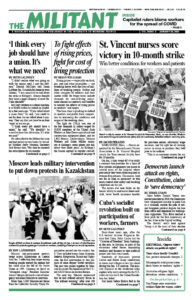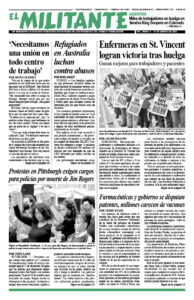SYDNEY — Australia’s ruling capitalist families have a long history of harsh border control measures against refugees trying to land by boat. Beginning in 2012, Canberra began paying the governments of Papua New Guinea and Nauru to run detention centers for such people seeking asylum in Australia.
Successive Australian governments refused entry to more than 4,000 asylum-seekers from a wide range of Asian and African countries. Canberra declared none would ever be allowed to settle permanently in Australia.
The policy has come under international pressure, as well as hunger strikes and riots in the detention camps. In 2017, Canberra was forced to pay a 70 million Australian dollar settlement ($50 million) after a lawsuit by over 1,900 detainees who had been harmed in the centers.
The Australian rulers announced in October they would stop sending detainees to Papua New Guinea and close the center there, while keeping the Nauru center running. “Anyone who attempts to enter Australia illegally by boat will be returned, or sent to Nauru,” Home Affairs Minister Karen Andrews said.
Some 1,200 former detainees from Papua New Guinea are now in Australia on “final departure” visas, while they make arrangements to leave the country. The U.S. government has accepted some 1,000, with hundreds of others forced to return to the countries they fled from. There are still more than 200 refugees in Papua New Guinea and Nauru.
In 2019 Canberra was forced to bring 192 asylum-seekers to Australia for medical treatment. Hotels refitted as immigration detention centers to house them in both Melbourne and Brisbane have become the focus of protests by the refugees and their supporters.
Most of these refugees never received the medical care they needed and are being held under indefinite detention. They are confined to their room and adjacent corridor, with no outdoor access, severely restricted visiting rights, and also face additional isolation imposed under the pretext of coronavirus quarantine.
More than 100 people have recently been released from this harsh “hotel” detention on final departure visas, but some 75 are still being held.
Fresh attention was brought to this issue when tennis star Novak Djokovic was detained Jan. 5 for failing to meet strict vaccination requirements on his visa. Until his release Jan. 10 he was being put up in the same Melbourne hotel where some 30 asylum-seekers are held.
Earlier some of the Serbian player’s tennis fans chanting, “Free Novak!” mingled outside the hotel with refugee activists shouting, “Free the refugees!”
Hossein Latifi, an Iranian refugee detained for nine years, told Al Jazeera Jan. 6 that he wished Djokovic well, but noted the sportsman had been sequestered for “just a few days” pending his legal appeal.

